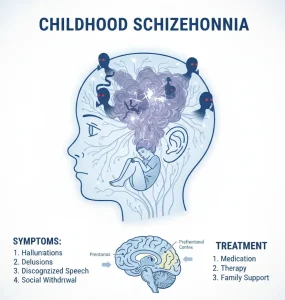Overview
Diagnosis
Diagnosis of childhood schizophrenia involves ruling out other mental health disorders and ensuring symptoms are not caused by alcohol, drugs, medication, or a medical condition.
The diagnostic process may include:
-
Physical exam to check for other causes or complications
-
Tests and screenings to rule out similar conditions and check for alcohol or drug use
-
Imaging studies such as MRI or CT scans
-
Psychiatric evaluation to assess behavior, thoughts, feelings, self-harm risks, thinking ability, and mood
-
Discussion of family and personal history
-
Using DSM-5 criteria from the American Psychiatric Association to confirm diagnosis
Challenging process
Diagnosing childhood schizophrenia can be difficult because other conditions such as depression or bipolar disorder have similar symptoms.
A child psychiatrist may monitor your child’s behaviors, perceptions, and thinking patterns over several months. As symptoms become clearer, a diagnosis can be made.
In some cases, medications may be started before an official diagnosis, especially if there are symptoms of aggression or self-injury.
Treatment
Childhood schizophrenia requires lifelong treatment, even during symptom-free periods. Managing this condition in children can be complex and needs a structured, ongoing plan.
Treatment team
Treatment is usually guided by a child psychiatrist experienced in schizophrenia. The care team may include:
-
Psychiatrist, psychologist, or therapist
-
Psychiatric nurse
-
Social worker
-
Family members
-
Pharmacist
-
Case manager to coordinate care
Main treatment options
Treatment for childhood schizophrenia often includes:
-
Medications
-
Psychotherapy
-
Life skills training
-
Hospitalization when necessary
Medications
Antipsychotic medications are the primary treatment for controlling symptoms such as delusions and hallucinations. The goal is to manage symptoms with the lowest effective dose.
Second-generation antipsychotics
These newer medications are generally preferred due to fewer side effects, though they can still cause weight gain, high blood sugar, or heart issues.
Examples include:
-
Aripiprazole (Abilify)
-
Lurasidone (Latuda)
-
Olanzapine (Zyprexa)
-
Quetiapine (Seroquel)
-
Risperidone (Risperdal)
-
Paliperidone (Invega), approved for children 12 and older
First-generation antipsychotics
These drugs are as effective as newer medications but have higher risks of neurological side effects, including tardive dyskinesia (a movement disorder). They are typically used only if newer drugs are ineffective.
Examples include:
-
Perphenazine, for children 12 and older
-
Thiothixene, for children 12 and older
Medication side effects and risks
All antipsychotics have side effects, which can sometimes be serious. Side effects in children may differ from adults and may be more severe. Parents should monitor for issues and inform the doctor immediately.
Antipsychotics can also interact with other medicines or supplements. Always inform the doctor about any products your child takes, including vitamins or herbal supplements.
Psychotherapy
Psychotherapy, or talk therapy, supports both the child and the family in managing schizophrenia.
Types of therapy include:
-
Individual therapy: Cognitive behavioral therapy helps children cope with stress, understand their condition, and stay consistent with treatment.
-
Family therapy: Provides education and support to family members, helping improve communication and reduce conflicts and stress.
Life skills training
Teaching life skills helps children function at age-appropriate levels.
Training may include:
-
Social and academic skills: Helps children manage school life, relationships, and daily activities.
-
Vocational rehabilitation: Prepares older children or teens for future employment and helps them maintain jobs.
Hospitalization
During severe episodes or crisis periods, hospitalization may be needed to ensure safety and proper care. Hospitalization helps stabilize symptoms and ensures the child receives adequate rest, nutrition, and hygiene.
After stabilization, partial hospitalization or residential care may be considered as ongoing treatment options.
Advertisement

